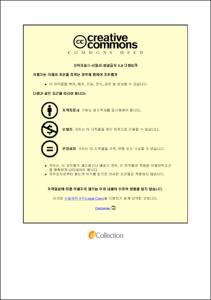자동차 운전자의 심리・생리반응을 고려한 온열감성 평가 및 적용에 관한 연구
- Alternative Title
- Research on Evaluation & Application of Thermal Comfort Sensibility Considering Psychological and Physiological Response of Automobile Drivers
- Abstract
- Automobiles, which can be called the result of technological integration, need more comfortable and practical improvements with the development of technology. Humans are demanding for more comfort and convenience in automobile, and want to apply new technologies in air-conditioning system. This paper presents evaluation data of psychological and physiological response and application for comfortable sensibility air conditioning system that can satisfy human needs and futuristic air conditioning system for automobiles.
In the preliminary research, the thermal comfort index has been using standardized PMV indices for decades with a focus on physical environmental factors. This is a pleasant indicator based on the numerical thermal equilibrium model, assuming that people will feel comfortable when the thermal elements of the human body and the surrounding thermal elements are in equilibrium. This index can be judged as an index reflecting the psychological factor through the experiment of the subject and the subjective factor as well. However, in the preliminary research, the comfort of the occupant changed as the air conditioning condition changed within the same PMV variation range. Based on these research data, it is necessary to take an index that considers the physiological response of the human body.
In this paper, we investigate the subjective human psychological responses such as the subjective questionnaire on the thermal comfort of the car, and the preference of the air conditioning system operating mode. Experiments were carried out on physiological responses such as brain waves, electrocardiogram, and skin temperature. Based on the results of psychological reaction and physiological response, we tried to evaluate the thermal comfort by the pleasantness evaluation index. And this paper not only evaluated comfort by the solar radiation and temperature conditions but also studied to prevent driving drowsiness due to CO2 in the car. We quantitatively evaluated the driver's objective psychological and physiological responses to the ventilation airflow of the air-conditioning system to demonstrate the arousal effect.
According to the results, the cold air of the air conditioner needs to be adjusted according to the solar radiation by the physiological response of the driver during the air conditioning of the automobile in the first 15 minutes of driving, on sunny day increased by 17% of the comfort and decreased by 23% of the thermal stress, on cloudy day decreased by 19% of the comfort, and increased by 54% of the thermal stress. For 20 minutes after boarding the driver, comfort in the physiological response by heating mode in the heating, warm-wire seat and heating & warm-wire seat mode rose by 27%, 17% and 20%. But the thermal stresses increased by 14% and 23% in heating, heating & warm-wire seat mode. However as the thermal stresses decreased by 19% in warm-wire seat mode, as a result active use of heating of warm-wire seat is required. In the drowsing state of the driver, when the wind stimulation was applied to the driver's face under the conditions of the air-blowing temperature of 21°C and the air velocity of 6m/s to 7m/s, In EEG changes the α/β decreased by 52.9% and as a result it was confirmed that tension was induced.
In this paper, we derive the thermal convert index based on the psychological and physiological variables and evaluate the driver’s warm sensation. And suggest a sensible air-conditioning operation method to create a pleasant and safe driver-centered indoor heat environment. And it can contribute to the development of a pleasant sensibility air conditioning system by applying human emotional factors in the design of futuristic automobile air conditioning systems such as self-driving car.
- Issued Date
- 2017
- Awarded Date
- 2017. 8
- Type
- Dissertation
- Publisher
- 부경대학교
- Alternative Author(s)
- Kim Min Soo
- Affiliation
- 부경대학교 대학원
- Department
- 대학원 냉동공조공학과
- Advisor
- 금종수
- Table Of Contents
- 제 1 장 서 론 1
1.1 연구 배경 1
1.2 연구 목적 5
1.3 선행 연구 8
1.4 연구범위 및 구성 16
제 2 장 승용차 실내 열환경 특성과 온열감성 분석 21
2.1 승용차 공조시스템의 구성과 실내 열환경 특성 21
2.1.1 승용차 공조시스템의 구성 21
2.1.2 승용차 실내 열환경 특성 25
2.2 온열감성 지표 31
2.2.1 온열환경 지표 31
2.2.2 주관적 심리반응 지표 39
2.2.3 객관적 생리반응 지표 42
2.3 온열감성 평가 프로토콜 56
제 3 장 승용차 실내 냉방 시 운전자 온열감성 평가 60
3.1 연구개요 60
3.2 여름철 승용차 실내 열환경 63
3.3 온열감성 평가 72
3.3.1 피험자 선정 72
3.3.2 실험 스케줄 74
3.3.3 실험 환경 77
3.4 실험결과 83
3.4.1 심리반응 83
3.4.2 생리반응 91
3.5 고찰 99
3.6 요약 105
제 4 장 승용차 실내 난방 시 운전자 온열감성 평가 107
4.1 연구개요 107
4.2 겨울철 승용차 실내 열환경 108
4.3 온열감성 평가 111
4.3.1 피험자 선정 111
4.3.2 실험 스케줄 112
4.3.3 실험 환경 116
4.4 실험결과 118
4.4.1 심리반응 118
4.4.2 생리반응 123
4.5 고찰 126
4.6 요약 129
제 5 장 승용차 실내 환기 시 운전자 송풍 효과 131
5.1 연구개요 131
5.2 온열감성 평가 134
5.2.1 피험자 선정 134
5.2.2 실험 스케줄 136
5.2.3 실험 환경 141
5.3 실험결과 142
5.3.1 뇌 파 142
5.3.2 심전도 145
5.4 고찰 149
5.5 요약 152
제 6 장 감성 쾌적 공조운전 프로세스 154
제 7 장 결 론 162
부 록 165
참 고 문 헌 190
감사의 글 199
- Degree
- Doctor
- Files in This Item:
-
-
Download
 자동차 운전자의 심리・생리반응을 고려한 온열감성 평가 및 적용에 관한 연구.pdf
기타 데이터 / 2.85 MB / Adobe PDF
자동차 운전자의 심리・생리반응을 고려한 온열감성 평가 및 적용에 관한 연구.pdf
기타 데이터 / 2.85 MB / Adobe PDF
-
Items in Repository are protected by copyright, with all rights reserved, unless otherwise indicated.